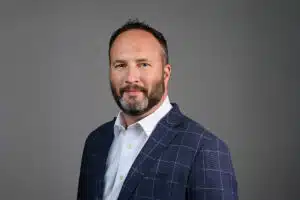
Impact Advisors Group’s Matthew Williams Earns Prestigious AEP® Designation
IAG is proud to announce that Matthew Williams has been awarded the Accredited Estate Planner® (AEP®) designation.

Author: Matthew Williams CFP®, RICP®, CEXP®, CASL® | Director of Financial Planning at Impact Advisors Group
We’ve all read or heard the stories. Someone passes away without a will, and potential heirs sharpen their knives in a free-for-all that can take years to play out in court. The emotional toll is immeasurable, with relationships incurring irreparable harm that can last generations.
Or, as highlighted just a few days ago in the Wall Street Journal, “The Brady Bunch Breaks Down: Estate Fights Tear Stepfamilies Apart—In Standard Estate Plans, a Surviving Spouse Often Has No Legal Obligation to Stepchildren,” failure to adequately plan can lead to devastating consequences for blended families.
“The default rules are out of touch with today’s family structures,” according to Danaya Wright, a University of Florida law professor.
In T.V. land, Carol would not forsake Mike’s three boys if her beloved husband passed first. Even their housekeeper Alice, who became part of the family, would have been taken care of.
But T.V. and real life don’t always line up. In today’s world, Greg, Peter, and Bobby could be left high and dry without a concrete written plan. The implications are real and immediate.
Without a will or trust, the state chooses how your estate is divided and who will take care of your minor children.
Only one-third of Americans have a will or a plan to distribute their assets after they die, according to a new survey from Senior Living Referral Service Caring.com.
According to a survey by USLegalWills.com, almost 9% had an out-of-date will, while a staggering 63% had no plan in place. Put another way, over two-thirds of Americans have a big hole in their financial plan. It’s crucial not to be part of this statistic!
But, you may ask, the wealthy make up a small percentage of those with significant assets, right? The wealthy hire the best and brightest to manage their affairs, right?
Well, not always. One in five Americans with investible assets of $1 million or more don’t have a will, according to a recent Charles Schwab survey.
Legendary talk show host Larry King used a short, handwritten note, with typos, to update his will.
“This is my Last Will & Testament. It should replace all previous writings,” said the letter. “In the event of my death, any day after the above date, I want 100% of my funds to be divided equally among my children Andy, Chaia, Lary Jr Chance & Cannon.”
That’s a recipe for a long and drawn-out court battle.
Whether young or old, the famous have passed on without written plans, including Aretha Franklin, Prince, Michael Jackson, Bob Marley, Jimi Hendrix, Sonny Bono, Kurt Cobain, and Amy Winehouse. Even Abraham Lincoln, who was a lawyer, didn’t have a will.
Valued at $80 million, the fight over Hendrix’s estate lasted over 30 years. Without a clear plan, your heirs could quickly turn to lawyers and the court.
But let’s be clear. Estate planning isn’t only for the wealthy.
Dying intestate—without a will—will have consequences no matter where you live. How your affairs are settled depends on the state in which you reside.
But it is especially painful if there are unmarried partners, stepchildren, and even a parent’s own child who may lose an inheritance.
Stop Procrastinating
If you have recently crafted an estate plan with an estate attorney or have updated your will, a hearty congratulations goes out to you. A holistic financial plan includes a plan of succession.
If not, let’s get started.
Estate planning requires us to do something today that hasn’t happened yet. Without a plan, your loved ones will be forced to guess your intentions against the backdrop of an already difficult situation. Even if potential heirs are on good terms, money has a way of creating divisions.
Key Takeaways
What is a will? It is a legal document stating how you want your executor (the person legally obligated to administer your estate) to distribute your assets after you die.
Your estate will go through probate, the legal process for reviewing the assets of a deceased person and determining who inherits what, whether you have a will or not.
If you have a will, it ensures the executor will honor your wishes.
A will lists your assets, bank and brokerage accounts, property, and more. Without a detailed document, potential heirs may be forced to search for assets spread across states and even countries.
Do you have designated beneficiaries for various accounts, such as IRAs? The beneficiary designation trumps the will.
What is a living will? It is written, legal instructions stating your preferences for medical care if you are unable to make decisions.
What is a trust? A trust is a legal contract that allows another person (the trustee) to hold property for you (the grantor).
This is typically so the beneficiaries (individuals or institutions who stand to inherit something) can use the property at some point in the future.
What is a living trust? You create a living trust to hold assets before and after your death.
What is a testamentary trust? It is a trust created by the will and only becomes effective after the grantor’s death.
Powers of Attorney
A durable power of attorney enables your agent to act on your behalf if you become ill or are unable to make decisions.
For example, a durable financial power of attorney allows your agent to manage your financial affairs if you become incapacitated or are unable to make decisions on your own.
A durable medical power of attorney allows you to appoint someone to make decisions about life-prolonging care, treatment, services and procedures.
DIY Hazards
Talking to a representative at Home Depot about your next painting project is commendable. Do-it-yourself (DIY) estate planning is cheap. It’s hard to argue against cheap unless you make unwanted mistakes that invalidate your wishes.
Estate planning is complex, and it helps to have professional advice. Saving a few dollars today can cost your heirs pain and anguish that could have easily been avoided.
Prepare Your Heirs
You don’t have to divulge the details, but informing beneficiaries opens the financial lines of communication, reducing the odds of a contested will. In addition, it promotes family unity at a time that can be exceedingly difficult.
Surprises breed resentment, and resentment may lead to unwanted consequences.
We recognize that estate planning is a personal process. In some cases, you may feel overwhelmed, especially if you have a large family, a blended family, or a family that has gone through separations and divorce.
Our objective is to initiate a dialogue, assist you in developing a plan, or motivate you to revise an existing one if the need has arisen.
We are always available to address any questions you may have.
Failure to act puts your legacy at risk.

IAG is proud to announce that Matthew Williams has been awarded the Accredited Estate Planner® (AEP®) designation.

Many find fulfillment in their work and plan to continue their careers well into their 70s and even beyond.

Against the backdrop of heightened political uncertainty and lower consumer sentiment, investors may have concerns about a recession.

To improve the odds that our business wins long term, it’s essential that we build up our defense against threats, both internal and external.